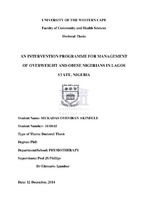| dc.description.abstract | Over the past decades there has been a global increase in the prevalence of overweight and obesity. The increase in the prevalence of overweight and obesity leads to surging of associated co-morbidities of overweight and obesity in low/medium income countries which eventually overburdens the vulnerable health systems threatens by malnutrition and communicable diseases in low/medium income countries. The designed interventions to curb overweight/obesity in high income countries might be inappropriate to apply in low income countries, such as Nigeria, due to the different cultural norms and values regarding types of food, and physical activity. The overall aim of this study is to design an intervention that will be culturally appropriate for overweight and obesity management among Nigerians. The convergent parallel mixed method design specifically was used in this study. This involves simultaneous timing of carrying out both quantitative and qualitative strands of mixed methods during the same phase of the research process, prioritizes the methods equally, and keeps the strands autonomous during analysis and then mixes the results during overall implementation/execution. The population for the quantitative part was Nigerians residing within sixteen enumeration areas of Alimosho Local Government area of Lagos State, Nigeria. Overweight and obese Nigerians as well as traditional healers and healthcare professionals were purposely selected for the qualitative phase. Delphi study was the last phase of study which involved recruitment of healthcare professionals in the management of overweight and obesity. A sample size of 2250 was projected and approached for this while 1571 consented and participated in the study. This gave a response rate of 69.82%. About 51.2% of the sample population was male and 48.8% female. The mean age of the total sample was 35.36(SD =11.66). Using BMI, the prevalence of overweight/obesity was 42.3% using BF%, the prevalence of body fatness was 39.2% of which 62.5% were females. Data analysis shows strong positive correlation between other measures of body fatness (.694 to .872) except WHR with low but positive relationships between BF% (184), BMI (.280), WC (.495), and negative relationships with HC (-.077) and BAI (-.076). Gender, marital status and age are predictors of overweight and obesity among Nigerians. Type of diet, meal timing, reduced physical activity and genetic factor were perceived as the causes of overweight and obesity. Diet therapy, an increase in physical activity and the use of herbs were various ways perceived to assist in reducing excess body weight. Among the challenges faced by overweight and obese Nigerians were lack of time for exercise because of the nature of their jobs, lack of recreational facilities, lack of motivations and support from family members to reduce weight, lack of money and poor/lack of knowledge to reduce weight. Experts unanimously agreed that the content of a culturally appropriate intervention should be individualised and to include physical activity/exercise, diet therapy, education and self-monitoring. There was a unanimous decision that the intervention should be done for a duration of 12 weeks at health facility and should be held for between 1-2 times per week if holding at community (excluding community/ public health facility) for 12 weeks in total. In addition, experts agreed that the use of media such as television, radio, weekly newspapers and magazines should be used for preventive campaigns. | en_US |

